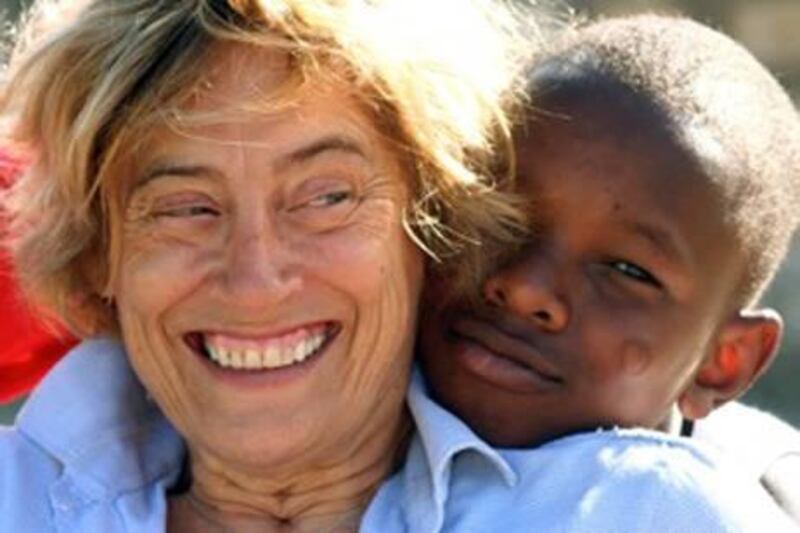France expressed anger and revulsion yesterday at the death of an elderly and disabled Frenchwoman who was seized by Somali kidnappers three weeks ago in Kenya and is believed to have been denied medication that might have saved her life.
Confirmation from the foreign affairs ministry in Paris that Marie Dedieu, 66, had died came after Kenya began cross-border raids aimed at Al Shabab, the Islamist militants linked to Al Qaeda and held responsible for a recent spate of kidnappings.
Mrs Dedieu, who used a wheelchair and suffered from cancer and heart disease, was snatched from her seafront home on Manda Island, in the Lamu archipelago, on October 1.
"This was an act of unqualified barbarism, violence and brutality," said Alain Juppé, the foreign minister, after a meeting of president Nicolas Sarkozy's cabinet, promising a firm response from France. "We condemn this in the strongest possible terms. We did everything possible to try to obtain her release, we tried to send medication by numerous different channels and apparently these savages could not care less."
A gang of 10 armed men carried out the kidnapping and were believed to have taken Mrs Dedieu quickly by boat to southern Somalia, defying efforts by the Kenyan navy to intercept them.
The kidnappers did not take Mrs Dedieu's wheelchair when they seized her and French officials were quoted by state-owned television yesterday saying the kidnappers "probably refused" to give her the medication they tried to send to her.
Mrs Dedieu spent about half of each year on Mandu Island, a magnet for tourists and backpackers, and has been described by villagers as a familiar and well-liked figure. If the motive was to extract a ransom, no demand from the kidnappers has been made known.
Her African partner, John Lepapa, told France-2 television: "They have done something very, very bad. I had been praying she would return alive and am now very, very sad."
The French foreign ministry acknowledged the circumstances of Mrs Dedieu's death were not immediately clear and that her poor state of health had probably been a factor. So far, there has been no suggestion she was violently killed by her captors.
"The contacts through which the French government was seeking to obtain the release of Marie Dedieu, held in Somalia since October 1, have announced her death," it said in a statement. "Mrs Dedieu's state of health, uncertainty over the conditions of her detention and the fact that the kidnappers probably refused to give her the medication that we sent her lead us to believe that this tragic outcome is unfortunately the most likely."
Mr Sarkozy was said by Pierre Lellouche, the secretary of state for foreign trade, to have been "very, very upset" during the cabinet meeting when Mrs Dedieu's death, and especially the details of what was known about the conditions in which she was held, was discussed.
The disability that required Mrs Dedieu to use a wheelchair related to an accident several years ago. She took medication every few hours to relieve the symptoms of her other medical conditions.
The foreign ministry said Mrs Dedieu's family had been notified of her death and added France was now seeking the unconditional return of her body. It voiced "indignation at the cruelty and complete absence of humanity shown by our compatriot's abductors" and called for those responsible to be identified and brought to justice.
"The French government expresses its profound shock, great sadness and solidarity with family and loved ones," the ministry added.
Somali officials have so far dismissed Kenyan claims that Al Shabab insurgents carried out the abduction. But the effect on Kenya's tourism industry could be severe and several European governments have responded to the series of kidnappings by warning travellers to avoid the stretch of Kenyan coastline bordering Somalia.
Five weeks ago, an armed gang murdered a British holidaymaker, David Tebbutt, and seized his wife, Judith, at a resort on Kiwayu Island, close to the Somali frontier. Mrs Tebbutt was also feared to be in the hands of Somalia kidnappers. More recently, two Spanish aid workers were abducted from a refugee camp.
Two British citizens, one an ethnic Somali and the other of south Asian descent and both residents of Cardiff in south Wales, have been arrested close to the site of the Tebbutt attack.
There has been no suggestion that the men, aged 18 and 19, were among foreigners suspected of being trained by Islamist activists operating near the border.
But Sky News quoted Charles Owino, a Kenyan police spokesman, saying: "They were arrested crossing into Somalia. They are under investigation by the anti-terrorism unit of the Kenyan police."
[ foreign.desk@thenational.ae ]
* With additional reporting by Agence France-Presse







